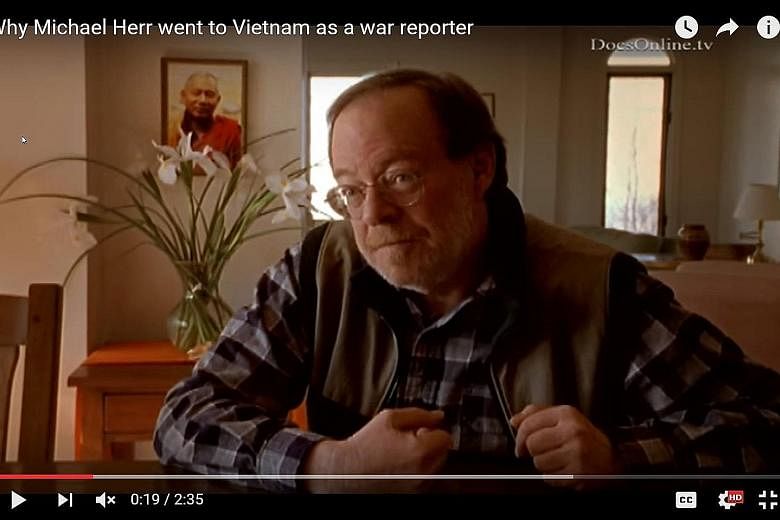WASHINGTON • Michael Herr, a Vietnam War reporter whose Dispatches remains one of the most powerful books about the ravages of combat and who later contributed to the screenplays of bleak Vietnam-set films such as Apocalypse Now (1979) and Full Metal Jacket (1987), died last Thursday near his home in Upstate New York. He was 76.
His daughter Claudia Herr confirmed the death, but declined to provide further details.
Dispatches, published in 1977, drew resounding critical praise. It was one of the first books to confront the Vietnam War in all its hallucinogenic awfulness and jarring absurdities. It was instantly placed in the pantheon of great war literature, widely viewed as journalism alchemised seamlessly into art.
Spy novelist John le Carre called Dispatches "the best book I have ever read on men and war in our time".
New York Times book critic John Leonard wrote: "It is as if Dante had gone to hell with a cassette recording of Jimi Hendrix and a pocketful of pills: our first rock 'n' roll war, stoned murder."
Part autobiography, part journalism but largely fiction, the book is an impressionistic tour de force of Herr's two years in Vietnam reporting for Esquire magazine at the height of the war. Shunning conventional reportage, the "non-fiction memoir", as it was sometimes called, illuminated the mundane and the terrifying, as well as how service members - and fellow journalists - endured their years in a hell zone.
The book arrived two years after the United States withdrawal from South-east Asia following more than a decade of war that cost more than 58,000 American lives and countless casualties among the Vietnamese, Cambodians, Laotians and others. Dispatches arrived as a shockingly visceral remembrance of a war that many wanted to forget.
"You know how it is, you want to look and you don't want to look," Herr wrote about the sight of dead bodies. "Once, I looked at them strung from the perimeter to the treeline, most of them clumped together nearest the wire, then in smaller numbers but tighter groups midway... Then I heard an M16 on full automatic, starting to go through clips, a second to fire, three to plug in a fresh clip, and I saw a man out there, doing it. Every round was like a tiny concentration of high-velocity wind, making the bodies wince and shiver."
In other passages, he evoked extreme survival measures: an American soldier who blanketed himself with the corpses of his comrades to avoid being bayoneted by enemy forces that had overrun them; or the American troops on a packed helicopter compelled to shoot Vietnamese allies who swarmed them and threatened to prevent the chopper's take-off amid hostile fire.
Shortly before leaving Vietnam, his photographer friend Sean Flynn, who later disappeared and was presumed dead, told him not to squander all he had seen on cocktail talk back in Manhattan.
Instead, he spent 18 months consumed by Dispatches, writing the bulk of it before spiralling into a breakdown. "Real despair for three or four years," he told the London Observer. "Deep paralysis. I split up with my wife for a year. I didn't see anybody because I didn't want anybody to see me."
He only gradually emerged, completing a book he knew would catapult him to renown. He was an instant celebrity, bombarded with interview requests and invitations to Hollywood soirees. He bristled at the fame and oddball requests from strangers who thought they owned a piece of him. He began a long and concerted effort to get off the radar.
He moved to England in search of a quiet life. One offer beckoned that he could not refuse: He wrote the trance-like narration (voiced by Martin Sheen) in film-maker Francis Ford Coppola's epic about war and madness, Apocalypse Now. He also co-scripted Stanley Kubrick's Full Metal Jacket and later wrote a book about Kubrick.
Michael David Herr was born in Lexington, Kentucky, on April 13, 1940, and grew up in Syracuse, New York, where his father worked as a jeweller. The younger Herr described himself as a "nice, middle-class, educated Jewish boy".
He recalled that as a pre-teen, feeling stifled, he sometimes followed strangers around town because he "just wanted to see how they lived". He entered Syracuse University and wrote for the college literary magazine, but he dropped out, driven by a wanderlust he attributed to his idolisation of Ernest Hemingway and other authors who drank and smoked their way across the globe.
Survivors include his wife Valerie Elliott, whom he married in 1977, and their daughters Claudia and Catherine Herr.
WASHINGTON POST

